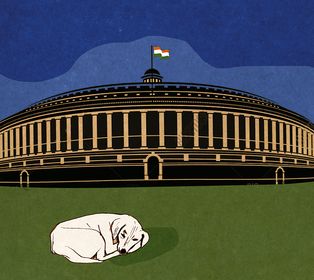The Parliament used to be an institution for enacting the 3Ds: Debate, dissent and decision. It was a dialectical process through which convergence of opinions was achieved on matters of national importance, resulting in a consensus. However, that dialectical process has now been substituted by a new set of 3Ds: Disruption, distortion and distraction.
Instead of attempting a consensus on important policy matters, the new 3Ds aim at disturbing parliamentary processes. With Parliament remaining paralysed since March 5, it appears that the opposition is fully determined to throw all legislative business out of the window. Both houses of Parliament—the Lok Sabha and the Rajya Sabha—have hardly conducted any business in the second part of this budget session. This session is important because two crucial bills—the Finance Bill and the Appropriation Bill—that would run the nation for the next one year, have been listed for passing. While the Finance Bill contains measures, such as revenues, taxes and income for filling up the Consolidated Fund of India, the Appropriation Bill allows the government to withdraw money, to meet the expenses of government departments through ‘Demand for Grants’.
However, with constant disruption of the Lok Sabha, the two vital legislations had to be put to vote, without a debate or discussion on them. There is a timeline in place for passing the money bills, and any deflection would force a shut-down in governance. Hence, the bills had to be passed with voice vote. The expenditure plan for Rs 89.25 lakh crore for the next fiscal year was cleared in 25 minutes, without a single word of discussion! A debate opens government bills and plans to multiple levels of external scrutiny, and subjects the same to criticism. Such discussions, and the publicity around them, generate a wider public debate that lead to the improvement of ideas, plans and proposals. This is what parliamentarians are expected to do. However, because of the disruptions, this is not happening.
What is happening is a crude manifestation of the opposition's intolerance. Outside Parliament, this intolerance manifests itself in spreading falsities and negativities about government policies, and within Parliament, it takes the form of disruptions. The cost of disruption is immense in financial terms. The cost of running the Parliament is a staggering Rs 2.5 lakh per minute, which translates to Rs 9.5 crore per day. Thus, Rs 130 crore has been wasted in the first two weeks of this session, with no meaningful business being transacted. Needless to say, this is a huge drain on the national exchequer.
The number of sittings in Parliament has been on a gradual decline over the years. While in the 1950s, Lok Sabha met for an average of 127 days a year, in the 1960s it went up to 138 average sittings, and then nosedived to 78 sittings in 2003, and 73 in 2011. After the gradual decline of the Congress's political dominance in the 1970s, and the arrival of coalition politics—in the post-Mandal days that saw the dominance of casteist and regional parties in government formation—the composition of the Parliament became more heterogeneous and less cohesive. It led to a different political culture, where confrontation and angry protests found more resonance with neo-politicians, than the earlier one of gentlemanly debates.
I believe the growing trend of disruptions and confrontation, and the morbid intolerance to the opposition viewpoint, is a manifestation of the general culture of discourtesy and disrespect that is creeping into Parliament from the wider society. Hence, there is an urgent need for procedural regulations to effectively control this trend. Otherwise, India will end up blurring all distinction between street politics and august parliamentary traditions.
Lekhi is member of Parliament.
forthwriteml@gmail.com


